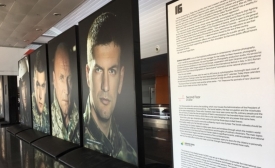Ukraine crisis
Some spokespersons have it tough. Think Sean Spicer trying to defend Donald Trump, Ron Ziegler defending Richard Nixon, maybe Dmitry Peskov fronting for Vladimir Putin. But the kind of tough job facing a spokesman that we should really respect is the one performed for the past three years by Col. Andriy Lysenko, spokesman of the Ukrainian armed forces. He comes daily to the Ukraine Crisis Media Center in downtown Kyiv and reports on-the-record on the state of the war in Ukraine’s eastern regions.

Mark Dillen on Ukraine's method of providing public information about the war.
It is necessary to protect the ongoing people-to-people cooperation from becoming yet another bargaining chip in the game of sanctions and counter-sanctions. To the extent possible, the people-to-people dimension of the EU-Russia relations should be insulated from the negative developments in security, political and economic dimensions.
It was -3 degrees in Munich over the weekend and, inside the 51st Security Conference, there was an unmistakable cold war chill. For three days the Bayerischer Hof hotel was a security and diplomatic lockdown as western leaders clashed with Russian counterparts over the way into – and out of – the Ukraine crisis. Delegates arrived in glum agreement over the risks posed by the conflict, and departed after heated disagreements over whether military might or diplomatic skill could save the day.
America’s top diplomat for Europe denounced Russian state-media coverage of the Ukraine crisis on Tuesday and belittled the Kremlin’s propaganda efforts in the United States as fallacious and ineffective. “All you have to do is look at RT’s tiny, tiny audience in the United States to understand what happens when you broadcast untruths in a media space that is full of dynamic, truthful opinion,” said Victoria Nuland, the assistant secretary of state for European and Eurasian affairs, referring to the Kremlin-backed global media company.
The latest experiment at Canada’s foreign affairs ministry trades the dry language of diplomacy for the chatty tone of the social Web in a pair of “listicles” written on BuzzFeed.
Russian President Vladimir Putin’s covert aggression in Ukraine continues – and so do Western sanctions against his country. But the economy is not all that is under threat; Russia’s soft power is dwindling, with potentially devastating results.
The standoff between NATO and the European Union is one of the most debilitating and shortsighted disputes between the two organizations, whose headquarters are but a twenty-minute bus ride from each other in Brussels.







